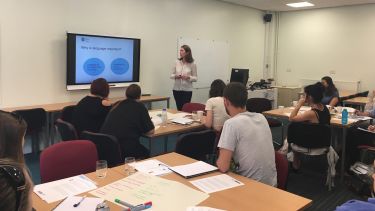Research has shown that executive function skills – the cognitive skills that allow us to pay attention, inhibit impulsive behaviours and keep relevant information in mind – are important for effective learning.
There are big individual differences in executive function skills, and there is evidence to suggest that children from more advantaged backgrounds tend to have better executive functions. In addition, children from more advantaged backgrounds tend to have better mathematical skills.
We aimed to test whether attainment gaps in early mathematics are due to differences in executive functions. We also aimed to test whether a brief executive function cognitive intervention would help to narrow any gaps.
Most research on this area to date has focused on school age children. Our work has focused on preschool children which is when executive function skills are rapidly developing.
What did we do?
We worked with 175 typically developing preschool children from socially diverse backgrounds in South Yorkshire. We measured their executive function skills and mathematical skills. We then randomly allocated the children to an executive function intervention group or to an active control group.
Children in both groups played computerised games for 20 minutes over four sessions in a month.
Children in the intervention group played games that involved executive function. For example, one game involved remembering where rewards were hidden behind objects, another game involved catching fish but not catching sharks. The active control group played games that involved basic attention and visual search.
We then measured children’s executive function and mathematical skills a week after the intervention and up to one year later. This allowed us to examine whether children in the intervention group improved on non-trained tasks over time.
The randomised control trial was pre-registered and followed CONSORT guidelines.
What did we find?
What skills support early maths?
We found that executive functions played an important role in early maths skills. In particular, visual memory and inhibitory control came out as important skills in helping children to solve maths problems.
Was there an attainment gap?
We did find an early attainment gap. Children from more disadvantaged backgrounds did have lower early maths skills.
What may be causing the attainment gap?
We found that one reason why we may see attainment gaps is because the cognitive skills that support maths, executive functions, may be lower in children from disadvantaged backgrounds and higher in children from advantaged backgrounds.
This is important because it would suggest that one way to narrow the attainment gap is to focus on supporting children with lower executive functions.
Can we narrow attainment gaps using cognitive training?
Despite executive functions playing this key role in early maths skills, the cognitive training intervention did not lead to any immediate or lasting improvements in executive functions or mathematical skills.
While children in our executive function intervention group did improve over training, this did not transfer to different, non-trained tasks. These results suggest that cognitive training is not an effective way to narrow attainment gaps, and that it may not be possible to improve the capacity or efficiency of executive function through training.
Instead, it may be more fruitful for researchers to focus on interventions that embed executive functions in mathematical or classroom activities, or aim to minimise executive function demands in learning activities.
The results from our study lay an important foundation for further work to explore the role of a child’s socioeconomic background in cognitive development, and for designing interventions to narrow attainment gaps that consider executive functions in diverse groups of children.
Project Team
Lead Investigators
- Dr Emma Blakey
- Dr Daniel Carroll
- Dr Danielle Matthews
- Dr Lucy Cragg (University of Nottingham)
Research Staff
- Dr Lisa Pepper
- Jessica Buck
- Dr David Cameron
- Ellen Ridley
- Emma Sullivan
- Ben Higgins
More information and outputs from our project
Scientific Report on this work: Blakey et al., (2020). The Role of Executive Functions in Socioeconomic Attainment gaps: Results from a Randomized Controlled Trial. Child Development. Online Early view available to view here.
Public report on this work: Blakey, Carroll, Matthews & Cragg (2019). The Role of Executive Functions in Explaining Attainment Gaps in Early Maths. Available to view here.
The Learning Scientists Podcast episode 21 ‘Executive Function Development’ with Dr Emma Blakey
Our School Readiness workshop for teachers and educational psychologists
On 10th July 2018 we ran a workshop for teachers and educational psychologists on school readiness. We discussed findings from the project and gave evidence-based advice on supporting school readiness.
We had three talks at the workshop, one on executive function development, one on school readiness and one on language development. You can view the slides from our workshop here.
Here are some photos from our event:





